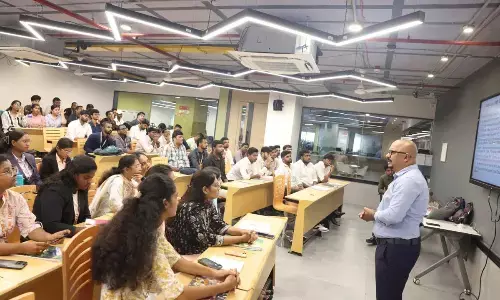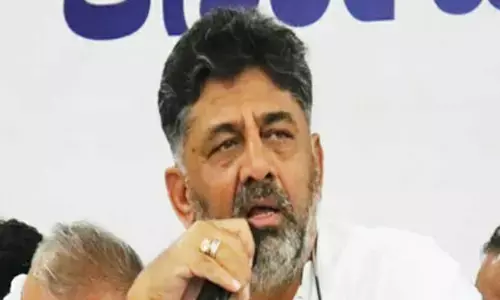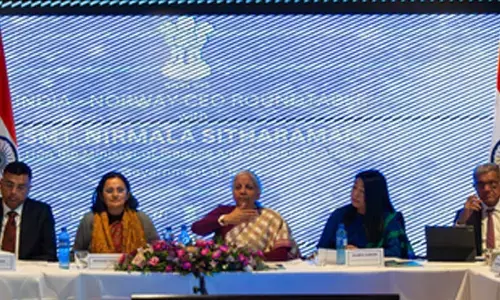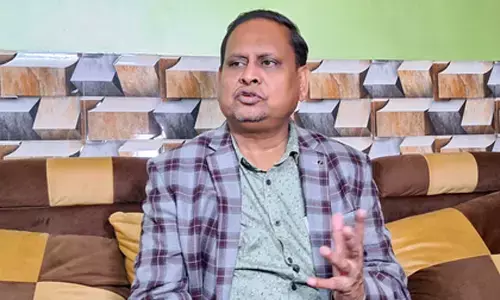Telangana State tenant farmers cup of woes

Kavali Jangamma and her husband Mallesham were tenant farmers who once owned half-acre agricultural land and a house. They had taken five acres on lease and cultivated Bengal gram, cotton and maize for five years, though without any access to open well or borewell. Their cotton crop was destroyed by pests, while the maize crop dried up, pushing them into a debt-trap.
Hyderabad: Kavali Jangamma and her husband Mallesham were tenant farmers who once owned half-acre agricultural land and a house. They had taken five acres on lease and cultivated Bengal gram, cotton and maize for five years, though without any access to open well or borewell. Their cotton crop was destroyed by pests, while the maize crop dried up, pushing them into a debt-trap.
Even after selling away their land and house, they could clear only a portion of their debts. More than Rs 4 lakh debt is still outstanding. Unable to repay the debts and having lost everything, Mallesham committed suicide by hanging from a tamarind tree. This Friday it will be his third death anniversary. Both her sons have discontinued education and the distraught family members are on the roads. Their rented house may collapse any moment.
Jangamma had applied for ex gratia compensation for her husband’s death, but her claim was rejected twice because she and her husband were tenant farmers and did not own any piece of land. However, had the couple been given a Loan Eligibility Card (which the State government is obliged to give tenant farmers after the enactment of Licensed Cultivators’ Act of 2011), the couple could have accessed bank loan and other benefits guaranteed to tenant farmers. Who knows? Mallesham could even have been alive today!
Jangamma articulated this painful story of hers during the public hearing of tenant farmers held at Sundarayya Vignana Kendram on Thursday. TJAC Chairman Prof Kodandaram, HRF president Jeevan Kumar, AIKS National President Sarampally Malla Reddy, former bureaucrat Gopal Rao and RSV representative Usha Seetalakshmi were the jury members, hearing the cup of woes of tenant farmers, many of whom had come from Siddipet, Karimnagar, Jangaon, Yadadri, Bhadradri, Adilabad, Vikarabad, Rangareddy and other districts of Telangana.
The cases brought to the notice of the jury members included those of victimized families of tenant farmers who had committed suicides; tenant farmers who had applied for LEC cards but whose applications were rejected; tenant farmers whose landlords were not cooperating with them in getting LEC cards; those who have LEC cards but did not get bank loans on specious grounds; tenant farmers cultivating on endowment lands but not getting LEC cards; tenant farmers holding saada bainamas and owning assigned lands, but not registered for Rythu Samagra Survey being carried out by the revenue officials in villages and those who had LEC cards but whose farm loans were not waived off .
Belli Chandramohan from Jangaon district testified, saying that the MeeSeva personnel weren’t accepting his application for LEC card because he was unable to get the patta khaata number from his landlord and that was one of the details needed to process the application. To this, Sarampally Malla Reddy said that as per the Act of 2011, it was the responsibility of the VRO to get those details and help tenant farmers complete their application process and get LEC card within 10 days.
Bingi Kanakaiah from Cheriyal mandal of Siddipet district said that there were 250 tenant farmers in his village cultivating leased lands for 20 years. When YS Rajasekhar Reddy was the chief minister of erstwhile Andhra Pradesh, he had given the farmers ‘Ek saal patta pass books,’ and even that didn’t help those farmers to get loans, as banks were apprehensive about giving loans because landlords had already taken loans on those lands and were not sure of whom to approach should tenant farmers fail to repay the loans.
Several other issues that tenant farmers have been facing were also highlighted. While LEC cards were issued when the Act came into force in 2011, during successive years the issue went into cold storage, some of the witnesses testified. Revenue officials were giving excuses, saying they did not have “orders from above” to renew LEC cards. MROs were saying there was no Government Order to give LECs.
MROs were asking tenant farmers to get letters from landlords giving complete rights on the property to tenant farmers. Even tenant farmers cultivating endowment lands (temple lands) have not been getting LEC cards, even though their details are registered with the officials, said Kiran Vissa, a representative of RSV.
To this, Malla Reddy replied, saying that there was already a Supreme Court judgement 80 (C) which states that tenders needed to be called for every year for endowment lands and that for tenant farmers cultivating less than 2.5 acres, tender wasn’t necessary. In fact, tenant farmers had an option to own the property by making payments in four instalments for those lands.
“Even compensation for crop damage, to which tenant farmers are entitled, are going into the hands of landlords. The reason is that revenue officials not entering tenant farmers’ names in records, while doing enumerations,” Kiran said. One of the issues raised by tenant farmers living on the outskirts of Hyderabad was that the lands they had cultivated for decades had overnight become hot cakes for real estate sharks and therefore landlords had stopped giving out those lands on lease.
To this, Jeevan Kumar said that it was after a pattern seen in localities like Ibrahimpatnam and other areas, where pharma cities are coming up. He suggested that the State government could lease out vacant government lands to these tenant farmers to make up for the loss of cultivable area. He stressed the need for the government to exert pressure on banks to follow RBI guidelines regarding giving loans to farmers, rectify the discrepancies in their computerized land records, and register under the Rythu Samagra Survey all assigned and forest lands given to farmers for cultivation.
Sangepa Borranna, a tribal rights activist from Adilabad agency area, said that the government had given pattas to 37,451 tribals over 1,35,000 acres in 2007, but now their lands were not being surveyed for giving Rs 4,000 per acre which Chief Minister K Chandrasekhar Rao intends to give to farmers as support from Kharif 2018. Podu lands, government lands, tenant farmers and farmers having saada bainamas were being ignored during the Rythu Samagra Survey.
“The reason that revenue officials cite is that there is no column in the registration form for survey to record these kinds of lands. But these farmers, numbering lakhs across the State, are being excluded from the Rs 4,000 per acre scheme due to this technical problem,” he said.
Testifying tenant farmers raised several other nettlesome issues like people having pattas, but no pass books; only some part of saada bainaamas being registered by revenue officials; differences in extent of land owned and extent of ownership being shown in computerized revenue records and hundreds of farmers from a single village having lavani pattas (for assigned lands) but not getting registered for Rythu Samagra Survey.
Usha Seetalakshmi said that there was an urgent need to appoint a Chief Commissioner for Land Administration (CCLA) -- the post that has been lying vacant since Raymond Peters left office. She blamed the failure of the agricultural extension system. For, farmers were taking advice from dealers about cultivation, instead of approaching agricultural officers.
Prof Kodandaram said that the jury would prepare a detailed report about the issues being faced by tenant farmers across the State and send them to the government soon. “It has to be remembered that out of the 14 lakh farmers targeted by the Telangana government for issue of LEC cards at the time of State’s formation, only 40,000 farmers have been given LEC cards till now.
Only 10 per cent of those LEC card holders can get loans amounting to Rs 26 crore, when the actual target of SLBC (bankers) was Rs 2,000 crore,” remarked Sarampalli Malla Reddy. After the public hearing, tenant farmers, along with activists of Rythu Swarajya Vedika went to CCLA office, met Sunitha, Joint Commissioner of Land Administration and submitted a representation to her, explaining the issues and seeking her intervention in resolving the problems of tenant farmers.
By Vivek Bhoomi









